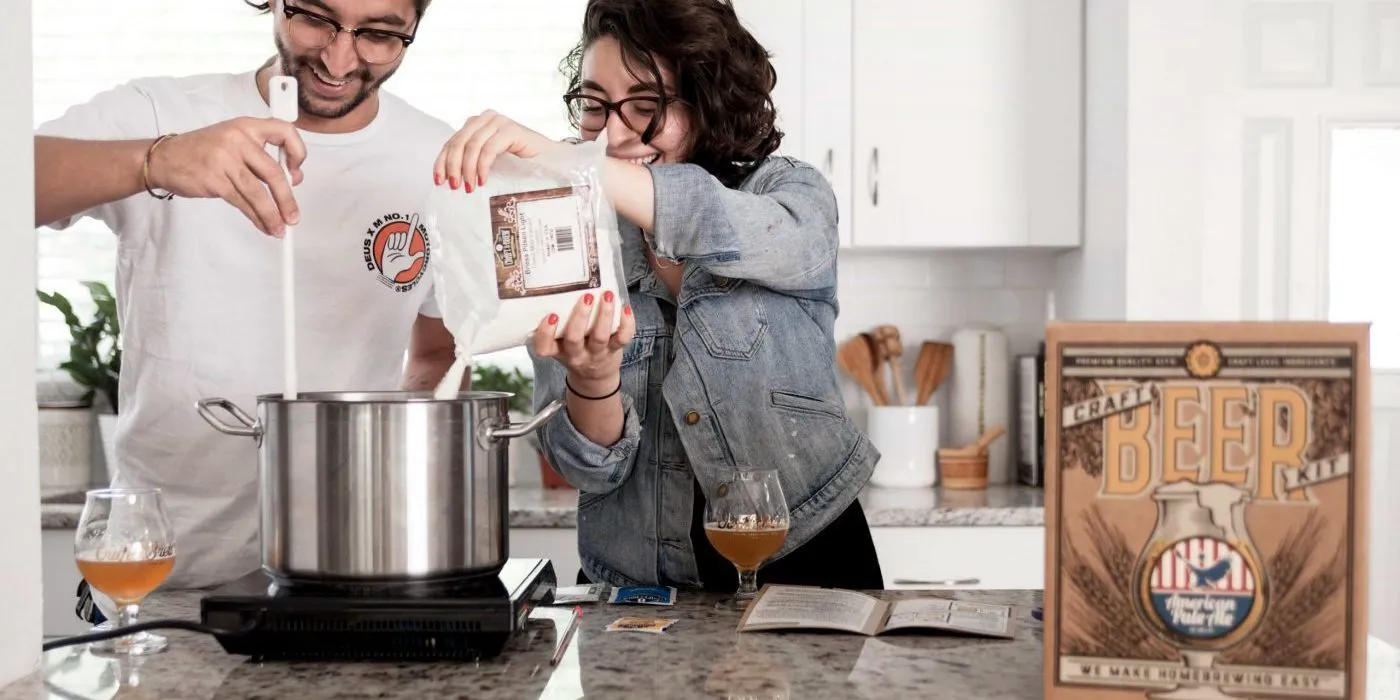Craft Your Own Beer: A Comprehensive Guide to Brew Kits
Homebrewing Made Easy: The Ultimate Guide to Craft Brew Kits
Homebrewing Made Easy: The Ultimate Guide to Craft Brew Kits
Which home brew kit is the best for you? Equipment considerations.
Fermenter
The vessel that your beer ferments in is an essential component of any beer brewing kit. A good quality fermenter is important for crafting the best possible beer at home. The fermenter is where the yeast gets to work converting sugars into alcohol, turning all those ingredients into beer. There are a variety of fermenters that brewers use, ranging in size, material and shape.
Glass Carboy
Craft a Brew and Brooklyn Brew Shop both use a classic 1 gallon glass carboy (jug), while Craft a Brew’s fermenter does feature a hop design. Glass is a tried and true material for fermentation for many reasons, but does have some drawbacks:
- It is impermeable to oxygen (your biggest threat during fermentation).
- It’s durable enough to sanitize & scrub clean between batches without scratching.
- Clear glass gives you a front row seat to fermentation. It’s fascinating to watch the yeast flury and dance in your beer. Plus, you can observe the color and clarity changes in your beer.
- The transparency of glass also means you may need to protect your beer from sunlight by covering with a towel, box, etc. or you’ll need to ferment in a dark area to prevent light-strike (which can cause off-flavors in your beer).
- Glass is delicate – so you will need to exercise more care in handling.
Plastic Fermenter
Mr. Beer homebrew kits use a proprietary 2 gallon plastic fermenter shaped like a keg, which also features a spigot for bottling your beer. This eliminates the need for siphon transfers, which is a plus, but plastic also has quite a few cons to consider:
- Plastic is lightweight, making storage & handling easy.
- Most plastic fermenters feature a wide opening, which makes cleaning and sanitizing easier.
- Plastic is much more susceptible to scratching. Scratches can quickly lead to contamination, as these small abrasions are prone to harboring bacteria.
Choosing The Best At Home Beer Brewing Kit
So you’ve decided you’re ready to brew your very first beer. Or maybe you’ve been brewing for a while but are new around here. If you are interested in choosing the best at home beer brewing kit, we’ve got the answer!
At Craft a Brew, our mission is to turn craft beer lovers into craft beer brewers. Every one of our kits is designed to be easy enough for the first time homebrewer, while delivering a finished product that tastes like you’ve been brewing your own beer for years.
Before we dive into the differences between our variety of beer making kits, there are a few things to consider when choosing the best at home beer brewing kit for your needs.
- Are you looking to brew 1 or 5 gallons of beer at a time?
- Do you have room for just a small fermenter or a larger fermenter?
- Do you need a homebrew fermenter or do you already have your own equipment?
- Do you need a complete beer making kit for beginners or are you only looking for beer ingredients?
- Are you purchasing for yourself or are you researching beer making gifts?
No matter where you are on your homebrewing journey, we have a beer making kit that’s right for you. We’ll walk you through our variety of beer making kits and how to choose the best home beer brewing kit to jumpstart your new hobby, including our:
ALREADY HAVE EQUIPMENT? JUST NEED BEER INGREDIENTS?
THE 1 GALLON BEER RECIPE KIT
Maybe you already have our 1 gallon beer making kit at home or maybe you inherited a friend’s beer brewing supplies and are looking for where to buy beer ingredients.
If you already have fermenting equipment or our 1 Gallon Home Beer Brewing Kit then our 1 Gallon Beer Recipe Kit is perfect for you. According to an old homebrewer superstition, an empty carboy is bad luck. So fill up your fermenter with one of our 20+ different beer styles, including IPAs, stouts, hazy brews & Belgian beers! Each 1 Gallon Beer Recipe Kit includes:
- Dry Malt Extract – dry malt extract is the foundation of your homebrewed beer. We use dry malted barley extract, which is high-quality and fresh, instead of liquid malt extract.
- Hops – each of our beer recipes features a unique blend of hops or features a single hop. Each 1 gallon beer recipe may include a single packet of hops or up to five!
- Specialty Grains – these give your homebrew its color and flavors. Grains may also help with your beer’s head retention or body. Each beer recipe will include a blend of pre-milled (crushed) grains or may feature a single type of grain.
- Grain Steeping Bag – grains are steeped in this cheesecloth-like bag (kind of like tea) to extract the character of the grains. This cloth bag keeps the grain husks out of your beer and makes it easy to remove the grains when you’re finished with them.
- Yeast – each beer recipe kit will feature a unique yeast strain per the style. Yeast is responsible for fermentation. It converts the starches & sugars from grains & malt into alcohol. Yeast also convert sugars into carbonation (CO2) during bottling & can contribute fruity esters, like Hefeweizen yeast’s signature banana & clove flavor.
- Additional special ingredients (per the recipe) – some of our beer recipes include special ingredients, like toasted oak chips, sweet orange peel, Belgian candi sugar, cacao nibs or lactose. If you are interested in learning how to customize your brew with special ingredients, we’d suggest brewing any of the following beer recipes:
Which home brew kit is the best for you? Ingredient considerations.
Base Malts
Base malts provide the main source of fermentable sugars in any homebrewed beer. Yeast convert these sugars into alcohol during fermentation. Every home brew kit will include base malts, but they can come in many forms including Extract (Dry or Liquid) or All-Grain. Let’s review the differences to determine which home brew kit is the best option for you.
Extract vs. All-grain
The simplest way to explain the difference between using malt extract or all grain is to think of brewing beer like making lasagna. You can make your noodles from scratch before baking your dish OR you can use store bought lasagna noodles. The noodles are made with the same ingredients (eggs & flour), but a box of noodles saves you a lot of time when making the dish at home. Think of malt extract like using a box of pasta, and all grain like making pasta from scratch.
An all-grain beer kit , like Brooklyn Brew Shop, requires the homebrewer to extract sugars from malted barley. This is done by milling, mashing & sparging the grains to create wort (unfermented beer).
- All grain really helps you learn about the beer making process!
- The all-grain brewing process is much more time intensive and can take 3+ hours. It also requires additional tools: multiple pots & a strainer.
- Because you’re tasked with extracting the sugars from your grains there is more opportunity for error and missing the target gravity (sugar content). Small fluctuations in temperature can result in major changes to the finished beer’s flavor.
An extract brew kit – like Craft a Brew or Mr. Beer – includes packaged dehydrated wort, which is prepared by master maltsters so you don’t have to perform those time-consuming steps yourself on brew day. Extract ensures consistency while delivering the flavor of a perfectly executed all-grain brew.
- A majority of homebrewers get their start with an extract kit.
- Extract significantly reduces the opportunity for error, which can impact fermentation & the finished ABV.



Tegs:
Search
Recent Posts
-
Experience the Thrill of Craft Beer at the Craft Brew Fest
Apr 22 2025
-
Spread the Joy of Christmas: Creative Nativity Craft Ideas for Everyone
Apr 13 2025
-
Grist House Craft Brewery: Experience the Flavor of Handcrafted Beer
Apr 14 2025
-
Dive into Fun: Whale Crafts for Preschoolers to Explore the Ocean World
Apr 14 2025
Subscribe to Updates
Get the latest posts and fashion insights directly in your inbox.